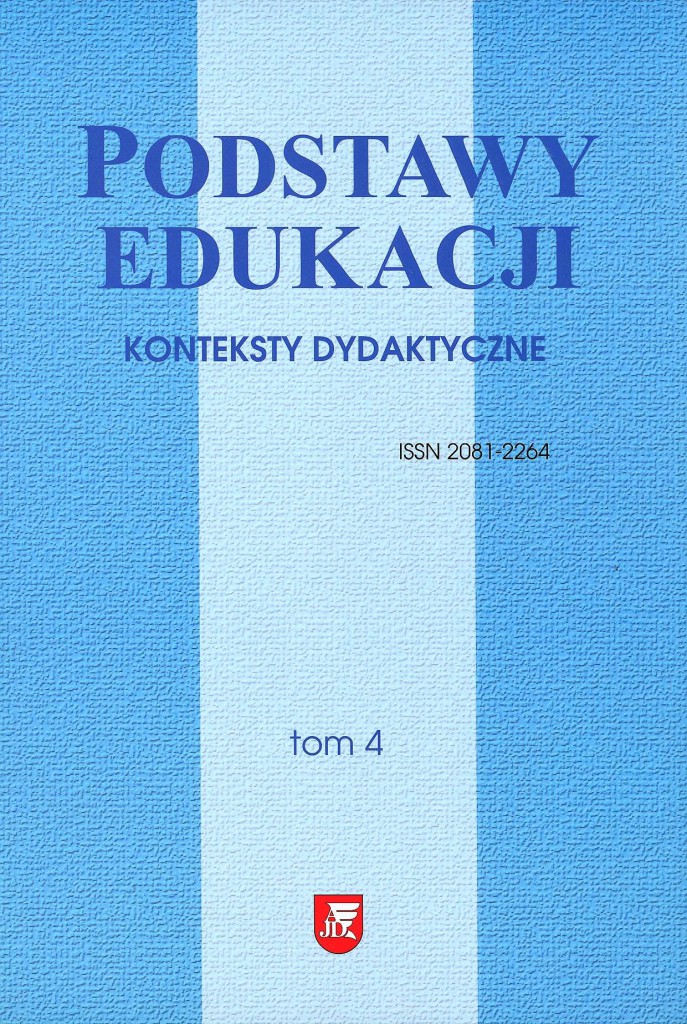Abstrakt
Artykuł podejmuje tematykę kryzysu polityki społecznej w krajach należących do UE. Systemy opieki społecznej UE, wzorowane w dużej mierze na welfare state, wykazują w ostatnich kilku latach niepokojące oznaki niewydolności, czego wynikiem jest nasilające się zjawisko narastania różnic majątkowych i pauperyzacji szerokich rzesz społecznych. Negatywne procesy zdają się mieć związek z kryzysem ekonomicznym, który trapi globalną gospodarkę od 2008 r., przyczyniając się do zaostrzania się rozmaitych konfliktów i powstawania nowych napięć, w tym etnicznych. W artykule znaczną uwagę poświęcono prezentacji kreatywnych form przeciwdziałania ekskluzji społecznej, zwłaszcza w obszarze psychoterapii i pedagogiki.
Bibliografia
Accardo, A., Corcuff, Ph. (1986). La Sociologie de Bourdieu. Bordeaux.
Baecker, D. (2005). Kommunikation. Lipsk.
Beach, D.M., Reinhartz, J. (1989). Supervision. Focus on Instruction. Nowy Jork.
Burbatti, G.L., Castoldi, I., Maggi, L., Sager, C.J. (1976). Marriage Contracts and Couple Therapy. Northvale (NJ) – Londyn.
Byram Karasu, T. (1992). Wisdom in the Practice of Psychotherapy. Nowy Jork.
Console, W.A., Simons, R.C., Rubinstein, M. (1993). The First Encounter: The Beginnings in Psychotherapy. Northvale (NJ) – Londyn.
Gofron A. (2009). Poznanie „między” modernistycznym faktem a postmodernistyczną intencjonalnością. W: A. Gofron, M. Adamska-Staroń. Podstawy edukacji. T. 2: Ciągłość i zmiana. Kraków.
Gofron, B. (2009). Między ciągłością a zmianą. Konserwatywne, liberalne i krytyczne ujęcie nierówności edukacyjnych. W: A. Gofron, M. Adamska-Staroń. Podstawy edukacji. T. 2: Ciągłość i zmiana. Kraków.
Grzesiuk, L. (red.) (2006). Psychoterapia. Warszawa.
Jarosiński, J. (red.). (2010). Demokratyczna Polska w globalizującym się świecie. I Ogólnopolski Kongres Politologii. Kielce.
Maisonneuve, J. (1962). Psychologie sociale. Paryż.
Martin, P.A. (1994). A Marital Therapy Manual. Northvale (NJ) – Londyn.
Morawski, W. (2002). Zarys powszechnej historii pieniądza i bankowości. Warszawa.
Ringler, M. (1976). Verhaltenstherapie. W: H. Strotzka (red.). Psychotherapie: Grundlagen, Verfahren, Indikationen. Monachium.
Spicker, P. (1993). Poverty and Social Security. Londyn – Nowy Jork.
Stern, B., Beer, de P. (2000). Réduire la pauvreté dans le monde: objectif ambitieux, réalisations modestes. Le Monde, 15.04.
Sztumska, B., Sztumski, J. (2002). Człowiek w świecie wartości. Katowice.
Sztumski, J. (1992). Społeczeństwo i wartości. Katowice.
Sztumski, J. (2000). Konfl ikty społeczne i negocjacje jako sposoby ich przezwyciężania. Częstochowa.
Trudgill, P. (1974). Sociolinguistics. Londyn.
Yalom, I.D. (2009). The Gift of Therapy. Nowy Jork.
Weishaar, M.E. (2007). Aaron T. Beck. P. Wiśliński (tłum.). Gdańsk.
Wiesmeyr, O., Batthyány, A. (red.) (2006). Sinn und Person. Bazylea.
Zielckie, A. (2009). Arme werden noch ärmer. Stuttgarter Zeitung, 17.03.
Zieliński, P. (2000). Samorealizacja i samowychowanie w zen i metodzie Sylwy. Częstochowa.
OŚWIADCZENIE AUTORA:
Mam świadomość, że czasopismo jest wydawane na licencji Creative Commons - Uznanie autorstwa (https://creativecommons.org/licenses/by/4.0/legalcode).
Przesyłając artykuł wyrażam zgodę na jego udostępnienie na tej licencji.
